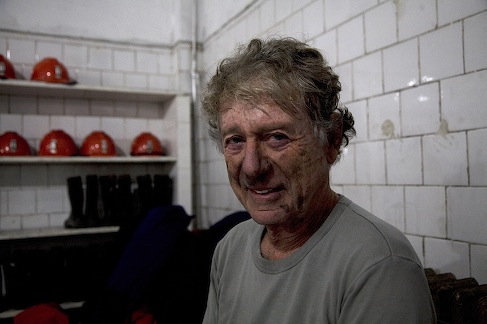Ted Koppel and Discovery rechristen China "The People's Republic of Capitalism"
07/08/08 03:37 PM

Premiering: Wednesday, July 9th at 9 p.m. (central) and continuing at the same hour through Saturday on the Discovery Channel
Anchored and reported by: Ted Koppel
Produced by: Ted Koppel and Tom Bettag
By ED BARK
Behold the master at work in what he bills as "the most extensive project I've ever undertaken."
That's saying something for former Nightline maestro Ted Koppel, even if he does say so himself in press materials.
Home base for his sixth Discovery Channel documentary -- The People's Republic of Capitalism -- is China's gift to urban sprawl and latter day capitalism. For four nights and as many hours, Koppel and his longtime producing partner, Tom Bettag, examine in depth what's become of Chongqing, China, a southwestern industrial megaplex with a population of 13.5 million and growing.
They begin, though, in Rolla, Missouri, where a Briggs & Stratton plant has laid off its workforce and instead opened a shop in Chongqing. The labor there is cheap, reliable and malleable. Meanwhile, middle-aged former assembly line workers are "shuffling through a job fair" back in Rolla.
In a way, this is oddly a good thing. Or it's at least less than an entirely one-sided tradeoff.
U.S. companies with some plants in China can make and sell products far cheaper, with Wal-Mart their mecca back home. By keeping prices down and moving their goods at a brisker pace, they in turn can still afford to keep some otherwise imperiled U.S. plants alive and reasonably well.
Those same disenfranchised Rolla workers do much of their shopping at Wal-Mart, which is top-heavy with discount-priced products made cheaper in China. A 50-year-old woman who used to work at the Rolla Briggs & Stratton plant is understandably bitter about being laid off. But she's also speechless when asked about the ancillary benefits of losing her job.
China, meanwhile, imposes heavy fines on couples who dare to have more than the government-sanctioned one child. And most of its workers, although increasingly better off financially, are still paid a shameful pittance for their long hours at menial jobs.
In a deft touch, Koppel illustrates the drudgery of an assembly line by repeating four times -- each time more rapidly -- "Snap it on. Plug it in. Check it out. Send it off." His kicker: "It's an endless, mindless, bottomless pit of a job."
A young woman, for instance, makes about $20 a week putting together boom boxes headed to Wal-Mart.
"Do you guys get high pay?" she asks Koppel.
"Yeah, we get high pay. Yeah," he replies.
"How much?"
"Too much," he says. "Maybe you should be a television reporter. What do you think?"
She thinks that would be good because working on an assembly line is a waste of her talent. Koppel for some reason gets a huge chuckle out of this. He sometimes does seem to have his nose a bit in the air.
Wednesday's chapter, titled "Joined At the Hip," is followed on successive nights by "MAOism to MEism," "The Fast Lane" and "It's the Economy, Stupid."
Koppel interviews a wide range of Chongqing denizens, including miners, prosperous developers, dirt poor peasants, teenage girls serving as "hosts" at a karaoke club and a conflicted young fashion photographer. On the one hand, he feels that his creativity is stifled. But he has no interest in dissenting against a government that he fully trusts to do the right thing.
"Talk about anything you like. Just don't get political," Koppel says of the capitalism that's replaced Chinese communism without an attendant explosion in individual freedoms.
Still, very much has changed, which The People's Republic of Capitalism also makes abundantly clear.
Koppel and crew spent a year putting this together, completing most of their work before May's devastating earthquake in China's Sichuan province. Some of the horrifying damage is depicted in still pictures while the focus remains on China's other seismic shifts as the Beijing-based Summer Olympics draw near.
It's all very eye-opening, with Koppel probing and sometimes prodding in a continuous effort to peel away all these layers. When an American developer says that "rampant democracy" would be bad for China's business climate, Koppel chides him for "pissing on democracy" enroute to getting rich.
The four-hour program is dedicated in the end to one of its associate producers, John Alexander, whom press materials say "died suddenly at age 26" in Chongqing. Koppel, for the record, is 68. Time marches on, but has yet to take him down.
Grade: A
